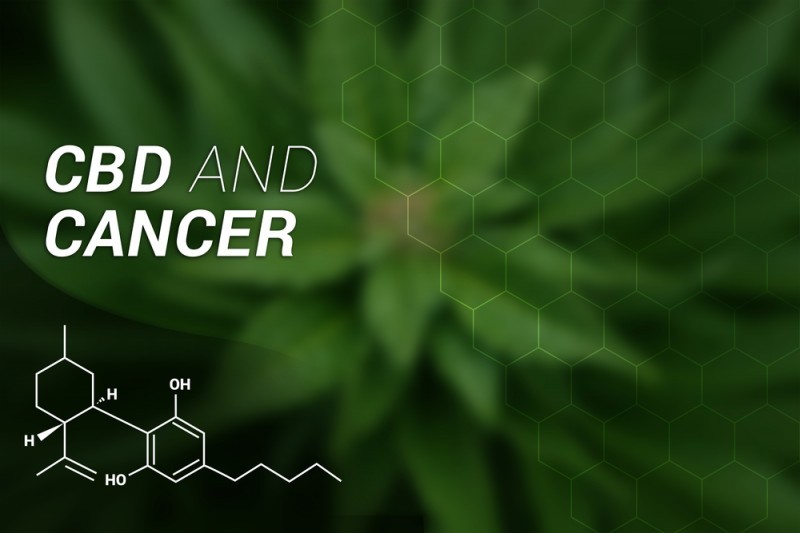CBD Oil has many potential benefits for Cancer patients like pain management, reducing nausea from chemotherapy the benefits of CBD/THC therapy are staggering. Studies have long shown that people who took marijuana extracts in clinical trials tended to need less pain medicine. How about killing cancer all together?
More recently, scientists reported that THC and other cannabinoids such as CBD, slow growth and/or cause death in certain types of cancer cells growing in lab dishes. Some animal studies also suggest certain cannabinoids may slow growth and reduce spread of some forms of cancer.
When it comes to medicine, I rely on proof and cold hard science. The fact is, the proof is in the pudding. Bio-Chemist Dennis Hill breaks it down quite elegantly. How cancer cells are targeted and eliminated by CBD and THC.
He says,
“Very simply, when THC connects to the CB1 or CB2 cannabinoid receptor site on the cancer cell, it causes an increase in ceramide synthesis which drives cell death. A normal healthy cell does not produce ceramide in the presence of THC, thus is not affected by the cannabinoid.
The cancer cell dies, not because of cytotoxic chemicals, but because of a tiny little shift in the mitochondria. Within most cells there is a cell nucleus, numerous mitochondria (hundreds to thousands), and various other organelles in the cytoplasm. The purpose of the mitochondria is to produce energy (ATP) for cell use. As ceramide starts to accumulate, turning up the Sphingolipid Rheostat, it increases the mitochondrial membrane pore permeability to cytochrome c, a critical protein in energy synthesis. Cytochrome c is pushed out of the mitochondria, killing the source of energy for the cell.
Ceramide also causes genotoxic stress in the cancer cell nucleus generating a protein called p53, whose job it is to disrupt calcium metabolism in the mitochondria. If this weren’t enough, ceramide disrupts the cellular lysosome, the cell’s digestive system that provides nutrients for all cell functions. Ceramide, and other sphingolipids, actively inhibit pro-survival pathways in the cell leaving no possibility at all of cancer cell survival.”
Basically, Mr. Hill is saying that the cancer cells are eliminated by the CBD and THC, preventing any chance of cancer cell survival… So why wouldn’t we be interested in this? There are varying opinions on this. I will give you the facts as I find them and let you make your own decisions.
There are over 80 cannabinoid compounds found in cannabis plants the most abundant of them are CBD and THC.
CBD therapies are used to treat a wide range of conditions: epilepsy, chronic pain, cancer, Crohn’s, diabetes, rheumatoid arthritis, PTSD, cardiovascular disease, chronic fatigue syndrome (CFS), Epstein Barr Syndrome, anxiety, antibiotic-resistant infections, multiple sclerosis, schizophrenia, migraines, and more.
So how is CBD able to work in the human body and treat these ailments?
CBD is a non-psychoactive compound in cannabis and hemp that doesn’t make you high. As you may know, inside the human body there’s the endocannabinoid system, with receptors spread throughout the brain and body. THC activates the CB1 and CB2 receptors, while CBD does not directly stimulate these receptors.
Cannabinoid receptors are involved in a series of processes inside the human body, including the regulation of mood, pain sensation, appetite and memory.
These receptors can be activated by endocannabinoids (produced by the human body) as well as by plant cannabinoids (like those found in hemp or cannabis), and they’re grouped in two main categories: CB1 and CB2.
CB1 receptors are found mostly in the central nervous system, and in smaller numbers in the liver, kidneys and lungs, while CB2 receptors are part of the immune system and found in the hematopoietic blood cells as well. CB1 play a role in the production and release of neurotransmitters, cannabis products that exert psychoactive effects stimulating these receptors.
At the same time, CB1 receptors are involved in the lipogenesis process that takes place inside the liver and seem to play a role in the maintenance of homeostasis (body’s internal equilibrium). Various studies suggest that CB1 also influence pleasure, concentration and appetite, memory and pain tolerance.
CB2 receptors on the other hand affect the immune system, being involved in a variety of functions like immune suppression or apoptosis (programmed cell death). Studies suggest that CB2 modulate the pain sensation and could play a role in various diseases, from liver and kidney problems to neurodegenerative diseases.
CBD does not stimulate these two receptors; instead, it activates other receptors, like the vanilloid, adenosine and serotonin receptors. By activating the TRPV-1 receptor for example, cannabidiol plays a role in the mediation of body temperature, pain perception and inflammation. Then, CBD inhibits the FAAH enzyme, a compound that activates the CB1 receptor. By doing so, CBD minimizes the activation of CB1 by THC, reducing its psychoactive effects.
High concentrations of CBD have been shown to activate the 5-HT1A serotonin receptor, exerting anti-depressant effects. The same receptor is involved in a series of processes from pain perception, appetite, nausea and anxiety to sleep and addiction mechanisms.
Finally, CBD blocks CPR55 signaling, decreasing bone re-absorption and cancer cell proliferation. GPR55 is widely present inside the brain, being linked with the modulation of bone density and blood pressure, as well as with cancer cell proliferation.
We Need More Research in the realm of CBD therapies and their affects on cancer en masse’!
With the ever-advancing sciences and technologies at our disposal, it is time we advocate for more research on CBD therapies. With discoveries being made in the realms of cancer, epilepsy, autism, dementia, pain management and more; the work and research being conducted on cancer therapies needs to be increased tenfold.
Stay Healthy!
Source: https://cbdamericanshaman.com/blog/cbd-s-impact-on-cancer-merits-further-research
Loading...


